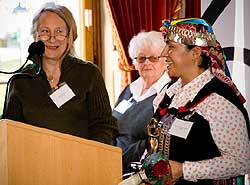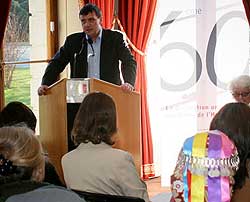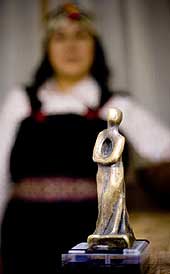
 |
|
|
| Home
| Front Page
| News
| Articles
| Documents | Environmental
| Archive
| Events Calendar Links
| About Us |
|
From the hands of the Mayor of Geneva: Rayen Calfunao Received an Award Recognizing her Humanitarian Work By Reynaldo Mariqueo – March 18, 2008 On Thursday, March 6, 2008, Rayen Calfunao Paillalef, a human rights activist, was given the award “Femme EXILE, femme engagée” (exiled woman, committed women), by the Association du Prix of the City of Geneva, Switzerland, alongside other women with similar merits from various parts of the world.
Short biography of Flor Rayen Calfunao Paillalef Rayen was born on August 28, 1961, in the Mapuche community of Juan Paillalef, municipality of Cunco , in Chile 's ninth region, La Araucanía, Wallmapu, daughter of Ambrose Calfunao and Mercedes Paillalaf. Her family descends from an ancient family of lonkos, who stood out during the military fight to defend the national sovereignty of the Mapuche nation. Through the knowledge of her people's history of resistance, orally transmitted by her ancestors, Rayen came to identify with their struggle and to feel pride in her ancestral roots. Since she was a child, she has known that the Mapuche national territory extended from the Pacific to the Atlantic Oceans, and that the Chilean and Mapuche territories were divided by the Bío-Bío River, and that the territory to the south of it was once and does belong to the Mapuche (People of the Land). Rayen's mother was widowed when Rayen was young. She had eight children and had to work arduously to sustain them. She sold products that her own land provided her in the local markets. Rayen often saw her mother cry but didn't understand her reasons or the complexity of their situation. When her mother took over as Lonko (chief of the community), many people from other communities came to speak to her, raising issues that affected neighbouring communities. This made her realize that the problem that afflicted her community was not unique and that they shared a common destiny and struggle with others. Rayen remembers that community members spoke of brutalities committed both by the police and landowners, as well as other injustices, and that they found themselves completely defenceless. On September 11, 1973, General Pinochet led the Military Coup in Chile . That same year, a few months later, Rayen, at about 12 years old, arrived from school to an empty home. Her mother had been arrested and imprisoned in the Temuco correctional facility, where she remained for about 2 years. Her brothers and sisters had been entrusted to the care of different families, who hid them. Since then Rayen has had to face life without her family: she has had to work hard to live, to feed herself, to provide herself with accommodation, and to go to school. Later, she learned that her mother had been beaten and tortured for having fought for her community's rights and for her Mapuche brothers and sisters, having represented them through her position as Lonko, and for having attempted to recuperate their lands, seized by the latifundistas (owners of large estates). By the mid 1970s, she was studying in Temuco . By the beginning of the 1980s, Rayen had moved to Santiago , where she worked, caring for an elderly couple during the day and studying in the evenings to improve her job opportunities. Rayen decided to once again take up the struggle and promote change through resistance, which included denouncing the arbitrary and unjust acts suffered by the members of her community. She understood the importance of informing the public opinion to sensitize and make people aware of the reality of her family and the Mapuche people. In 1990, Rayen was hired in Santiago by Rodrigo Nieto Maturana, Second Secretary of the Chilean Embassy in Sweden , to work as a nanny. There, she was exploited, poorly paid and despised for being Mapuche. The “diplomat” and his family practically treated her as a slave, denying her a decent place to sleep, giving her little food, and rarely allowing her any free time to leave the house, as she was also obliged to take care of the children from other Chilean diplomatic families. In 1991 she decided to escape her captivity. In order to receive her salary, which corresponded to one year's work, she had to wage a veritable battle. Rayen had to ask for help from the Chilean refugee community in Sweden , the media and the Chilean Ambassador himself in that country in order to force the “diplomat” to pay her salary. Alone, without knowing a single person, she began the task of searching out humanitarian organizations. She soon found the support and strength of Swedish people and organizations, such as the Sociala Missionen (Social Mission). Her freedom allowed her to take up the struggle for her community's rights, supported by the organization mentioned above, and to make contacts with non-governmental organizations specializing in the defence of human and indigenous rights. This same organization hired her to work for them (during the Gulf War) and she also worked as a volunteer for the Swedish Red Cross. Rayen learned Swedish and began to organize information gatherings, to speak on a local radio program, to put together documents for the press to report abuses, and to garner support for her people's struggle. In 1994 she decided to return to Chile and the community of Juan Paillalef, to help her mother with the reconstruction of her home, destroyed by unknown assailants who were never identified. Later, she moved to Santiago to work and study, among other subjects, English. By the end of 1995 she met – by chance – a former Mapuche political refugee living in Switzerland, who was visiting family in Santiago and who invited Rayen to visit her in that country. In 1996 she travelled to Switzerland and, after some time, settled in Geneva where she currently lives. She also learned French, which she now speaks fluently. Rayen works to earn a living and also acts as a human and indigenous rights researcher for the United Nations.
Unsurprisingly, her life has never been disconnected from her people's struggle. She dedicates all her free time to this struggle, as well as to convincing international organizations specializing in defending human and indigenous rights to denounce and act upon the dramatic situation that affects her people. In Geneva, Rayen, along with other Mapuche residents of this city, and people supporting the Mapuche cause, visits organizations, prepares documents, organizes public demonstrations, writes letters and petitions, sets up information booths, and collects signatures during the different cultural or public events that take place in that city. When she can, Rayen participates in the Human Rights Council's deliberations or those of other UN organizations. When I asked her about her commitment to the Mapuche cause, she replied: “I always wanted to do for others what I would have wanted somebody to do for me, when I was living in the situation that my lamngen (brothers and sisters) find themselves living in today.” As spokesperson for her community in Geneva, I asked her about the contacts she has made with other Mapuche communities which, like her own, suffer the same level of repression, Rayen says: “I have been establishing contacts with the maximum number of communities, so that they can be the ones to speak and I, who am here in Geneva, can communicate the gravity of the situation of the Mapuche Nation and its communities to the corresponding human rights organizations.” The Influence of a Family in the Mapuche National Struggle The political persecution against the Calfunao Paillalef family has proven to the Mapuche people that no matter what kind of regime is at the head of the Chilean Government, whether democratic or dictatorial, right of left, the repression, abuses and injustices that the Mapuche must endure never change. Likewise, the government's policy of dispossession continues to justify the transfer of Mapuche territory to third parties. Many generations of Rayen's family have experienced this situation, as demonstrated by their testimonies, a situation which is widely known throughout Wallmapu and by an international public. The situation influences the type of solution yet to be found to the historic problem that exists between the Mapuche Nation and the Chilean State . The latter appears to have no political will to confront this situation in a constructive fashion. The situation also brings into question the type of relationship that should exist between both peoples. The criminalization of the just demands of the Mapuche people makes this relationship more and more strained. Rayen comes from an old family that refuses to submit to the brutal force of an oppressive state and a supercilious social class, which uses any means to destroy their community. Rayen and the rest of her family question the existence of injustice and conflict; for this reason, her family suffers violent and permanent repression, which today includes the imprisonment of almost all her family. In effect, many members of her family are currently being held in different correctional facilities in the city of Temuco for their connection to, or for being at the head of, their community's struggle. Her sister, Juana Calfunao (the current Chief of her community) and her husband the werken Antonio Cadin have been held since 15 November, 2006. Her sister Luisa was also detained on that date and has been held since then at the Temuco women's correctional facility. Her mother was detained for a long time as a precautionary measure. Likewise, in recent years and on different occasions, several of her nieces and nephews, including children, were detained together with their parents, some of whom were imprisoned as a precautionary measure. Her nephew, Waikilaf, was a prisoner in a jail in Temuco where he was tortured. Later, for having denounced his captors, he was transferred to a high security prison in Santiago , located more than 800 kilometres away from his native community, to prevent him from receiving visitors and to break his morale and fighting spirit. Moreover, Rayen's nephew Jorge Cadin was released on 7 November, 2007, after having remained in the Temuco prison for almost a year, and this for precautionary measures, merely for being the brother of Lonko Juana Calfunao.
As a member of a family whose community is in conflict, a situation that innumerable Mapuche communities face, Rayen knows better than anyone the poverty that the family members of political prisoners must face. And so she keeps in contact with many of them, always ready to denounce their situation to the world. For her there are no differences between communities or organizations when the violation of Mapuche human rights are involved, and she considers it her moral duty to support these communities and organizations; to this end, Rayen comments: “ the important thing is that they [the political prisoners] know what we are doing and of my concern for their situation. That's why I work hard to keep in contact with their families, their spokespeople in some cases, and directly with their communities. ” Rayen has learned and developed non-violent strategies for this fight. She knows that the cause is just and that she will continue to defend the rights of her people. She is the brilliant portrait of the historical resistance of her ancestors and joins those women who, like her, fight for a more just world, free from discrimination. When I asked her if there was any way to improve the Mapuche effort at the level of the United Nations, she confessed that: “ maybe we should establish a permanent Mapuche mission at the UN, we must make a monitoring system and determine whether or not Chile is respecting the international treaties that it has ratified and if its reports to the Council correspond to reality, for that we need to coordinate and support each other to make this work relevant and effective . ” When I asked her about the importance that she attributed to the award, she commented: “ this award allows me to further raise awareness about the struggle of my people and the serious human rights abuses that are being committed against Mapuches.” In spite of the problems in her life and the tragedy that her family faces, which naturally affects her, Rayen socializes, lives and smiles together with her friends and her daughter Andrea, who divides her time between Chile and Switzerland, fighting with equal devotion alongside her mother. We pay homage to Flor Rayen for her work and we congratulate her for the award, which she very much deserves. _______________________________ Translated from Spanish by Sara Smith
|
| |
||
|
||


